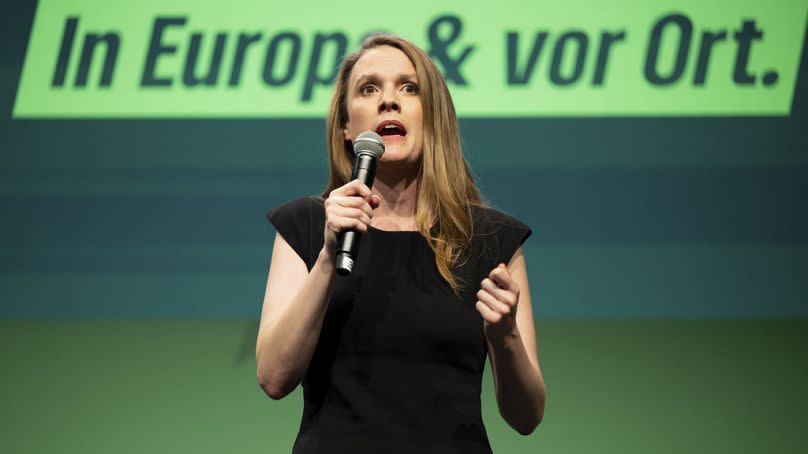EU elections: Is ‘greenlash’ behind the rise of the far-right or are other factors at play?

Recent months have seen a backlash - or ‘greenlash’ - against the European Green Deal, the main policy of the European Commission under President Ursula von der Leyen: the most visible of these being the farming protests that blocked the border between Spain and France.
And with voters heading to the polls this week to vote for a new European Parliament, surveys indicate increased support for politicians who want to weaken these policies, lower climate goals, or ignore environmental actions altogether.
The Euronews Super Polls show that the European Parliament will likely have a strong right-wing majority after the elections on 6-9 June, with green parties expected to lose seats.
Other important issues, such as high energy prices resulting from the war in Ukraine and the unaffordable cost of living, have begun to overshadow environmental policies for both current leaders and voters.
At an event in Paris this April, European Commission Vice-President Maroš Šefčovič declared, “From the recent farmer protests to the rise in support for populism cultivating a resistance to climate policies, we can see signs of wariness among our citizens. So we must continue to cultivate the support of Europeans and European businesses for green policies.”
The growing ‘greenlash’ against Europe's environmental focus is being fuelled by right-wing and far-right parties across the region, who are attempting to tap into voters' concerns about the cost of green policies.
Too far or not far enough? These are Europe’s most and least popular climate policies
Could far-right voters spark a backlash on the EU's Green Deal?
Which political parties are fuelling greenlash?
In Spain, one of the EU countries most affected by climate change, the far-right Vox party opposes policies linked to the Green Deal, defining them as “climate fanaticism at the expense of European farmers and ranchers”. They also deny that humans cause climate change and want to undo recent environmental rules.
In Italy, a recent analysis by the Italian Climate Network showed a general absence of climate denial in party manifestos, with instead a tendency to emphasise the dangers and costs of the energy transition, especially by parties such as Lega and Brothers of Italy.
In Germany, the centre-right European People’s Party (EPP) - set to lead in the elections and remain the largest faction in parliament - was criticised by Terry Reintke's Green party for what they describe as attempts to water down the Green Deal in response to a wave of farmer protests. Reintke pitches her party as the antidote to “right-wing, authoritarian” politics.

“Citizens have the choice whether they want to have a more right-wing majority in the European Parliament, potentially having authoritarian, far-right forces influencing the programme of the European Commission... or whether they want to have progressive, forward-looking, future-oriented policies,” Reintke told Euronews.
In Sweden, home to environmental activist Greta Thunberg and long considered a pioneer in the fight against climate change, the government, backed by the far-right Sweden Democrats, has been criticised for slowing down and adopting policies that could increase emissions, according to the Swedish Climate Policy Council.
Are Europeans less worried about the climate crisis?
Despite expectations of a right-wing majority, data reveals voter ‘greenlash’ isn’t necessarily the driving force. Over three-quarters of Europeans remain deeply concerned about the direct effects of environmental issues on their everyday lives and health, as per the May Eurobarometer survey.
About 84 per cent also believe that EU environmental laws are crucial for protecting their country's environment.
In Spain, Greece, Cyprus, Malta, Portugal and Italy, between 88 and 98 per cent of citizens believe that environmental factors affect their wellbeing.
Climate activist protests have not been absent, such as those in the streets of Brussels in April.

But that doesn't necessarily mean voters won't be swayed by the political discussion.
“It's definitely different circumstances than in 2019 when we started with this maximum support and the political willingness to act from... across the parties,” European Commissioner for the Environment, Oceans and Fisheries Virginijus Sinkevičius told news agency Reuters.
“But then we come to more difficult files [EU legal proposals] where I think, inevitably, they are very much affected by the political debate,” he says.
With the Greens poised to lose a third of their seats according to the latest polls, it’s possible that issues such as inflation, migration and security could eclipse environmental concerns this time around.
Hope is not yet lost, however. “In 2019, the polls didn’t predict our record-breaking success, but we went from 52 to 74 seats in the European parliament,” Bas Eickhout, a Dutch MEP and the Green party’s joint lead candidate for the European elections, told UK newspaper The Guardian on Tuesday. “We have good hopes that through strong mobilisation, we will defy the polls once more.”


